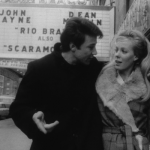Boxcar Bertha Review
Posted on April 20, 2014 By John Gilpatrick 1970s, Classic Reviews, Movie Reviews
The winsome harmonica that opens Martin Scorsese’s second feature film, Boxcar Bertha, should be all the indication you need that it isn’t the kind of movie we’ve come to expect from the king of the gangster flick. Boxcar Bertha is Southern-fried pulp through and through. From the characters’ unmistakable drawl and the incessant sound of buzzing cicadas to the clingy sundresses to the gentlemanly suits and hats, the film is nothing if not a spot-on (though slightly overexaggerated) study of a time and place.
But Boxcar Bertha has grander intentions. It’s story is one of desperation and principles. To what end will a man stand up for what he believes in? And to what end should he? These are the questions Scorsese and company try to answer over a period of 90 minutes. They succeed to a degree, but the film isn’t quite focused enough. Producer Roger Corman’s influence is front and center as the film devolves into a sex-filled exercise in exploitation cinema, which distracts mightily from Boxcar Bertha’s primary dramatic thrust.
Barbara Hershey plays the film’s titular character who, in the film’s opening scene, is orphaned when her father—a crop duster—crashes his plane. She’s consoled by a black man, Von Morton (Bernie Casey), and the head of the local union, Big Bill Shelly (David Carradine). Quickly, her relationship with Bill becomes sexual, but the two are separated, as Bill’s union leadership puts him constantly at odds with the law.
While separated, Bertha meets a Yankee, Rake Brown (Barry Primus), who fashions himself a con man, but isn’t much more than a card cheat. She helps him with his Southern accent, and the two try to rip off a local railroad baron. But it goes disastrously wrong when the man starts talking about killing Big Bill. Bertha shoots the man, they track Bill down, and hitch a ride to safety on a boxcar.
Later, the trio hooks up with Von, and this new group of four starts robbing uber-wealthy Southerners. Big Bill, however, doesn’t like the practice. He fashions himself an honest man, and he wants to fight for justice without taking advantage. But the more these people are put up against it, the more acceptable their behavior feels.
With a title like Boxcar Bertha, one would assume the focal point of the film would, in fact, be Bertha. That’s a surprisingly debatable point. Big Bill’s journey from a principled leader to a reluctant thief plays as heavily into the outcome of Boxcar Bertha as Bertha’s own journey from naive daddy’s girl to prostitute and ganger leader. And one can only be thankful that it does. Bertha is a disappointingly lame character, and Barbara Hershey isn’t quite able to make her jump off the screen at us. David Carradine, meanwhile, performs with real gravitas. His character is very interesting; Without him, there might not be much reason to care.
When the film focuses on Bill, or even when it splits time between he and Bertha, it’s pretty engaging. Unfortunately, they’re an ill-fated duo that spends as much time separated by circumstance as it does together. The film tends to grind to a halt during these sequences of separation. Ditto time spent with Rake and Von. Neither of these individuals is clearly motivated, making them seem more like tagalongs than anything else. Rake, especially, starts off with plenty of defined attributes and goals, but they never amount to anything. It’s the kind of thing Scorsese never really does anymore, but this is his second film, and he’s still working out the kinks of 90-minute-plus storytelling.
That said, Boxcar Bertha (despite not exactly feeling like Scorsese’s heart is into this in the same way) is a step up from his debut, Who’s That Knocking at My Door. The cinematographic choices are occasionally fascinating, and the film’s ending is a real doozy. What comes next is one of the director’s most beloved features, so things won’t ever really be the same. While that could be a tad sad in some instances (seeing small-scale director go big), there’s no need to with Scorsese. Neither of his first two films holds a candle to his later works.
1972, Barbara Hershey, Boxcar Bertha, David Carradine, Martin Scorsese, Roger Corman

















